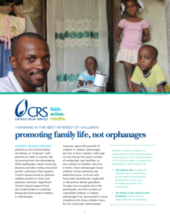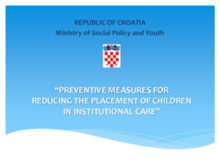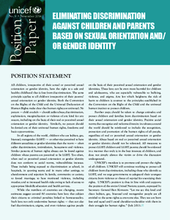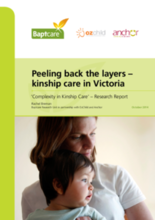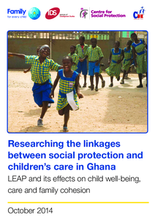Displaying 341 - 350 of 505
Through a desk review of peer reviewed journal and “grey” literature published in English and Russian languages, this paper provides a review of current deinstitutionalization efforts in the region, identifies potential challenges, describes the need for economic empowerment interventions, and outlines directions for future research.
This document, published by Catholic Relief Services, urges members of the Catholic faith community to consider the best interests of the child when partnering, or “twinning” with parishes in Haiti and undertaking charitable activities.
On 10 September 2014, UNICEF and the Permanent Mission of Bulgaria co-hosted a high level Lunchtime Discussion on The right of children below three years to live in a caring and supportive family environment: examples from Central and Eastern Europe and Central Asia.The discussion took place on the margins of the September meeting of the UNICEF Executive Board and brought together over 80 participants, including members of the UNICEF Executive Board, representatives of the Permanent Missions to the UN from the CEE/CIS region, international organizations, NGOs, high level UNICEF and National Committee staff. Representatives from Croatia presented on preventing institutionalization of children.
This report presents findings from the impact evaluation of a parenting and family skills intervention for the displaced Burmese population in Thailand called the Happy Families Program which was implemented by the IRC from 2011 to 2013.
This research brief provides an overview of an impact evaluation of the “Happy Families Program,” conducted by the International Rescue Committee (IRC). The Happy Families Program is a parenting and family skills intervention designed for Burmese families living on the Thai-Burmese border.
This position paper from UNICEF clearly states that all children have a right to a safe and healthy childhood, free from discrimination. This discrimination includes discrimination against children based on the real or perceived sexual orientation or gender identity of children or their parents.
This document reports on an Institutional Learning Process that has critically analysed the impact and effectiveness of Terre des hommes’ (Tdh) engagement in Albania over the last 14 years. It looks at the role Tdh has played in the emergence of a State Child Protection System (CPS) in Albania.
Baptcare, OzChild and Anchor - three organizations that provide kinship care services in Victoria, Australia - commissioned this research to explore the impact that complexity in care arrangements has on children and families in kinship care.
This report was written by Keetie Roelen and Helen Karki Chettri from the Centre for Social Protection (CSP) at the Institute of Development Studies (IDS), with inputs and support from Family for Every Child and Challenging Heights, Ghana. The report investigates the links between child wellbeing, children’s care, family cohesion and the Livelihood Empowerment Against Poverty Programme (LEAP), a national social protection scheme in Ghana which aims to reduce extreme poverty in the country and is centred on providing cash transfers to the most vulnerable.
This study involved the use of qualitative methods as part of a larger process evaluation to explore the longer-term experiences of parents who participated in a randomized controlled trial (RCT) of the Incredible Years Parenting Programme (IYPP) in disadvantaged settings in Ireland.

